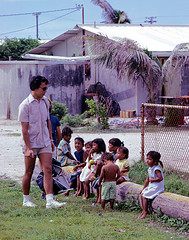RMI Education and Skills Strengthening Project
The Government of the Republic of Marshall Islands has actually received financing from the World Bank for the Education and Skills Strengthening Project (ESSP) cost. It means to use part of the profits for seeking advice from services.
The consulting services ("the Services") will help the Project Manager and the RMI National Training Council in executing the World Bank-funded task efficiently.
The assignment will concentrate on supporting the Project Implementation Unit (PIU) in developing a framework for Recognition of Prior Learning (RPL) for TVET, aimed at helping the College of the Marshall Islands and the RMI National Training Council examine and improve the skills of employees through certified college accreditation.
The detailed Terms of Reference (TOR) for the assignment are suggested in the attached Terms of Reference (ToR).
The National Training Council now invites qualified individuals ("Consultants") to show their interest in offering the Services. Interested Consultants ought to offer details demonstrating that they have the required credentials and pertinent experience to perform the Services (connect a Cover Letter of no more than four (4) pages attending to the mandatory experience and credentials requirements curriculum vitae with a description of experience in similar assignments, similar conditions, etc). Companies' personnel may reveal interest through the using firm for the project. In such a scenario, only the experience and qualifications of people will be considered in the selection procedure. The requirements for electing the Consultant are: A.
Mandatory Qualifications and Experience Master's degree in education, training
, management, or a related field. Minimum of 5-10 years of experience working in TVET System. Curriculum Design and Systems.

Have 2-5 years' experience designing and
executing RPL. frameworks, policies, and treatments. A sample of previous work will be required as evidence of previous experience. Exceptional interaction, training, and facilitation
skills. Experience with working with varied stakeholders, consisting of federal government. agencies, TVET institutions, companies, and students in the Pacific. B. Desired Qualifications and Experience Ability to deal sensitively in a multicultural
environment and develop efficient team relationships with clients and appropriate stakeholders. The attention of interested Consultants (including companies )is drawn to paragraphs 3.14, 3.16 and 3.17 of the World Bank's"
Procurement Regulations for IPF Borrowers "July 2016 revised November 2020" Procurement Regulations ", setting forth the World Bank's policy on dispute of interest. More details can be acquired at the address below throughout office hours, 0900 to 1700 local time. Expressions of interest need to be
provided in a written form to the address below (personally or by e-mail )by 5:00 pm, 23rd December 2024.
The subject line needs to state:"National Training Council Strategic Plan Consultant -full name of the prospect". Julius Lucky Director National Training Council!.?.!ntcdr@ntcinfo.org:Phone: 692 625-4521 Empowering Community Champions for Sustainable Development in RMI Gender Equality, Climate Resilience and Water Safety Training Majuro,
Republic of the Marshall Islands: The 4th
Women and Youth Training for
Gender Equality, Climate Change, Disaster Risk Reduction and Water Safety Management has just recently occurred at the University of the South Pacific's campus in Majuro, the Republic of the Marshall Islands(rmi national training council ). This vital training was arranged by the United Nations Development Programme( UNDP )Pacific Office through the Addressing Climate Vulnerability in the Water Sector(ACWA) task. The week-long capacity-building training aimed to empower ladies and youth with the knowledge and practices needed for climate-resilient water security management in the
Republic of the Marshall Islands(RMI ). This training strengthens a dedication to boosting rmi national training council's water security and neighborhood strength versus climate modification effects, especially females
and youth, making sure that no one is left behind. The training invited participants from all 24 atolls and featured resource speakers from government companies, non-governmental organizations, and worldwide development partners from the RMI Environmental Protection Authority, Climate Change Directorate, Office of the Chief Secretary, Ministry of Culture and Internal Affairs, National Disaster Management Office, Women United Together Marshall Islands, RMI Human Trafficking Task Force, Waan Aelõñ in Majel, Jo-Jikum, and the International Organization for Migration. In her opening remarks, Secretary for the Ministry of Culture and Internal Affairs, Brenda Alik, underscored the significance of collective action in developing a climate-resilient nation."It is our duty to come together and interact. As we deal with the challenges presented by environment change, comprehending its impact on our water resources is essential for improving the well-being of neighborhoods across the Marshall Islands,"she stated.

RMI Environmental Protection Authority General Manager Moriana Philip highlighted in her speech the essential role of ladies and youth in resolving climate-related challenges."This workshop joins us from different communities to resolve the pressing issues we deal with today, consisting of climate-related difficulties, especially on our water resources."We want to stress the crucial function of women and youth in this task as your involvement contributes to its success and beyond, "she stated.
The very first day of the workshop covered vital issues connected to gender equality, human rights, and public health within the Marshall Islands. It included conversations on gender equality and mainstreaming, concentrating on the effects of environment change on water security and the out of proportion results on susceptible groups. The importance of integrating gender equality and social addition into all project elements was likewise discussed. Human rights and human trafficking were tackled, stressing the requirement for thorough protection of vulnerable populations

throughout emergency situations. Furthermore, the workshop addressed gender-based violence, highlighting the numerous forms that can develop in catastrophe situations, such as domestic violence and sexual coercion. The program concluded with a concentrate on sanitation and hygiene and their important function in health, incomes, school participation, self-respect, and building resilient communities. ACWA Project Manager Koji Kumamaru expressed his appreciation to all participants
, emphasizing the importance of their contributions to their communities."Women and youth are key to the success of the ACWA job. More notably, you are the champs and future leaders who will go back to your communities to empower others,"he said. Throughout the workshop, individuals visited Rongrong Island and took a look at the 15,000-gallon Flatpack Modular water tank set up at the Rongrong High School Boys Dormitory as part of the ACWA task. The setup is an essential part of the task, complemented by assistance from Australia
's Department of Foreign Affairs and Trade. The see functioned as a valuable direct experience of the favorable effect of the ACWA job on the neighborhood and its
water resources. Marie Naisher from Jabat Island expressed her appreciation for the chance to join the workshop and explained her desire to be part of the project when it reaches Jabat.
"This was my first time participating in such training, and I discovered a lot from the guest speakers, group activities, and the website visit. I now understand the importance of tidy water and how to sterilize it. I'm thrilled about the ACWA job coming to Jabat and all set to assist when it arrives,"she stated. Don Kobney, an ACWA site organizer from Santo, Kwajalein, also shared his enjoyment."The workshop and website see enhanced my self-confidence and understanding of the water tank setup.
Seeing the 15,000-gallon flatpack modular water tank firsthand gave me a clear understanding of the system, and I'm eagerly anticipating sharing this understanding with my community, "he said. By the workshop's end, individuals were better equipped to understand climate modification and its regional effects, drive adaptation and mitigation efforts, particularly in water security, and make use of brand-new resources to affect their neighborhoods favorably. ACWA is made possible thanks to the support of the Green Climate
Fund, with the job co-financed by the Government of the Republic of the Marshall Islands
. The Marshall Islands: Skills Training and Vocational Education Project Examines the efficiency of the job and highlights lessons. Supplies inputs to two wider evaluations- the regional examination of ADB support for the Pacific and the special examination research study on Millennium Development Goals. The low instructional attainment and scarcity of Marshallese skilled workers were mostly due to the low quality of fundamental education, lack of access to education in the outer islands, and weak points in abilities training and the trade and technical education system.
These supported an economy marked by high unemployment because of constrained economic sector growth and government downsizing. Unemployment was particularly high amongst the youth and ladies in the outer islands. Appropriate regional proficient personnel for existing job vacancies
were unavailable, hence the importation of properly skilled foreign workers. Hence, there was a mismatch between offered jobs and skills of the Marshallese labour force. These conditions supplied the effort for the Government
of the Marshall Islands to prioritize technical and occupation education training reforms. In 2000, ADB approved a loan for $9.1 million to enhance abilities training to provide trained workers required for sustained economic and social development. This was to be attained through an integrated nationwide skills training system. The job included four elements: advancement of a profession awareness program, abilities training enhancement, boosted skills training opportunities for ladies and youth, and institutional strengthening. The anticipated outcome was increased income-generating opportunities and work for students, especially women and youth in the external islands. Overall, the job was rated unsuccessful. Restricted development was accomplished in making the task responsive to the requirements of its beneficiaries and private-sector employers. The enduring weak point of poor numeracy and literacy proficiencies
among public primary and secondary school graduates and dropouts going into college or participating in voc-tech education could be partly attributed to the poor quality of basic education. The job was supply-driven and could not establish a strong linkage with economic sector requirements or align its activities with the requirements of the labour market. The status of the technical and occupation education training system has remained basically the very same after task completion. The study advanced that ADB might motivate the Government of the Marshall Islands, through assessment and policy discussion, to follow through on the federal government's
commitment to developing a dedicated labour information system to connect technical and occupation education training program offerings with industry demand. Although the task set up a labour market information system, in the lack of internal personnel capability at the National Training Council, it was not fully operational.

